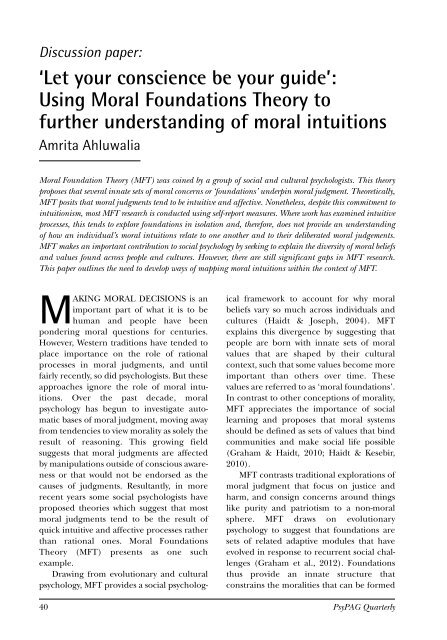Social Psychology Special Issue
PsyPAG-Quarterly-Issue-973
PsyPAG-Quarterly-Issue-973
Create successful ePaper yourself
Turn your PDF publications into a flip-book with our unique Google optimized e-Paper software.
Discussion paper:<br />
‘Let your conscience be your guide’:<br />
Using Moral Foundations Theory to<br />
further understanding of moral intuitions<br />
Amrita Ahluwalia<br />
Moral Foundation Theory (MFT) was coined by a group of social and cultural psychologists. This theory<br />
proposes that several innate sets of moral concerns or ‘foundations’ underpin moral judgment. Theoretically,<br />
MFT posits that moral judgments tend to be intuitive and affective. Nonetheless, despite this commitment to<br />
intuitionism, most MFT research is conducted using self-report measures. Where work has examined intuitive<br />
processes, this tends to explore foundations in isolation and, therefore, does not provide an understanding<br />
of how an individual’s moral intuitions relate to one another and to their deliberated moral judgements.<br />
MFT makes an important contribution to social psychology by seeking to explain the diversity of moral beliefs<br />
and values found across people and cultures. However, there are still significant gaps in MFT research.<br />
This paper outlines the need to develop ways of mapping moral intuitions within the context of MFT.<br />
MAKING MORAL DECISIONS is an<br />
important part of what it is to be<br />
human and people have been<br />
pondering moral questions for centuries.<br />
However, Western traditions have tended to<br />
place importance on the role of rational<br />
processes in moral judgments, and until<br />
fairly recently, so did psychologists. But these<br />
approaches ignore the role of moral intuitions.<br />
Over the past decade, moral<br />
psychology has begun to investigate automatic<br />
bases of moral judgment, moving away<br />
from tendencies to view morality as solely the<br />
result of reasoning. This growing field<br />
suggests that moral judgments are affected<br />
by manipulations outside of conscious awareness<br />
or that would not be endorsed as the<br />
causes of judgments. Resultantly, in more<br />
recent years some social psychologists have<br />
proposed theories which suggest that most<br />
moral judgments tend to be the result of<br />
quick intuitive and affective processes rather<br />
than rational ones. Moral Foundations<br />
Theory (MFT) presents as one such<br />
example.<br />
Drawing from evolutionary and cultural<br />
psychology, MFT provides a social psychological<br />
framework to account for why moral<br />
beliefs vary so much across individuals and<br />
cultures (Haidt & Joseph, 2004). MFT<br />
explains this divergence by suggesting that<br />
people are born with innate sets of moral<br />
values that are shaped by their cultural<br />
context, such that some values become more<br />
important than others over time. These<br />
values are referred to as ‘moral foundations’.<br />
In contrast to other conceptions of morality,<br />
MFT appreciates the importance of social<br />
learning and proposes that moral systems<br />
should be defined as sets of values that bind<br />
communities and make social life possible<br />
(Graham & Haidt, 2010; Haidt & Kesebir,<br />
2010).<br />
MFT contrasts traditional explorations of<br />
moral judgment that focus on justice and<br />
harm, and consign concerns around things<br />
like purity and patriotism to a non-moral<br />
sphere. MFT draws on evolutionary<br />
psychology to suggest that foundations are<br />
sets of related adaptive modules that have<br />
evolved in response to recurrent social challenges<br />
(Graham et al., 2012). Foundations<br />
thus provide an innate structure that<br />
constrains the moralities that can be formed<br />
40 PsyPAG Quarterly


